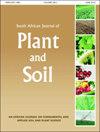Predicting soil carbon in granitic soils using Fourier-transform mid-infrared (FT-MIR) spectroscopy: the value of database disaggregation
IF 0.7
Q3 AGRONOMY
引用次数: 0
Abstract
Soil carbon (C) is an important component in quality assessments and efficient models are required to estimate C rapidly. Accurate C assessments are valuable in monitoring land-use changes. Fourier-transform mid-infrared (FT-MIR) spectroscopy has proved to be a powerful tool for assessing C. The potential of FT-MIR spectroscopy to estimate C was evaluated using the following techniques: (1) three algorithms [partial least squares (PLS)], principal component regression (PCR), and classical least squares (CLS); and (2) disaggregating the dataset into subgroups based on soil depth and texture. The C contents of samples collected in the Johannesburg Granite Dome were determined by dry combustion for comparison. The soils ranged considerably in C (0.123–2.650%), clay (2.80–41.20%), and silt content (8.56–23.75%). Using standard normal variant (SNV), Savitzky-Golay smoothing and PLS, the best-performing model was the horizons subgroup which provided values of root mean square error for prediction (RMSEP) between 0.079 and 0.095%, root mean square error for calibration (RMSEC) = 0.041 − 0.092, r 2 pre = 0.6174–0.8459, r 2 cal = 0.6599–0.9778, residual prediction variation (RPD) = 2.404–2.753, and ratio of performance to interquartile range (RPIQ) = 2.667–3.454. The pronounced accuracy of FT-MIR spectroscopy coupled with PLS, pre-processing techniques, and textural subgroups confirms the potential of infrared spectroscopy as an efficient tool for estimating C content. Future studies should investigate the combined effects of FT-MIR spectroscopy and subgroups grouped according to soil types and land-uses when predicting C.傅里叶变换中红外光谱(FT-MIR)预测花岗岩土壤碳:数据库分解的价值
土壤碳(C)是质量评估的重要组成部分,需要有效的模型来快速估计碳。准确的C评估在监测土地利用变化方面很有价值。傅立叶变换中红外光谱(FT-MIR)已被证明是评估C的强大工具。使用以下技术评估了FT-MIR光谱估计C的潜力:(1)三种算法[偏最小二乘(PLS)]、主成分回归(PCR)和经典最小二乘(CLS);以及(2)根据土壤深度和质地将数据集分解为多个子组。通过干燃烧测定在约翰内斯堡花岗岩圆顶采集的样品的C含量以进行比较。土壤的C(0.123–2.650%)、粘土(2.80–41.20%)和含泥量(8.56–23.75%)变化很大。使用标准正态变量(SNV)、Savitzky Golay平滑和PLS,表现最好的模型是层位亚组,该亚组提供了0.079至0.095%的预测均方根误差(RMSEP)和校准均方根误差 = 0.041−0.092,r 2 pre = 0.6174–0.8459,r 2 cal = 0.6599–0.9778,残差预测方差(RPD) = 2.404–2.753,以及绩效与四分位间距的比率(RPIQ) = 2.667–3.454.FT-MIR光谱与PLS、预处理技术和结构亚组相结合的显著准确性证实了红外光谱作为估计碳含量的有效工具的潜力。未来的研究应该调查FT-MIR光谱和根据土壤类型和土地用途分组的亚组在预测C。
本文章由计算机程序翻译,如有差异,请以英文原文为准。
求助全文
约1分钟内获得全文
求助全文
来源期刊

South African Journal of Plant and Soil
Agricultural and Biological Sciences-Plant Science
CiteScore
1.90
自引率
11.10%
发文量
32
期刊介绍:
The Journal has a proud history of publishing quality papers in the fields of applied plant and soil sciences and has, since its inception, recorded a vast body of scientific information with particular reference to South Africa.
 求助内容:
求助内容: 应助结果提醒方式:
应助结果提醒方式:


